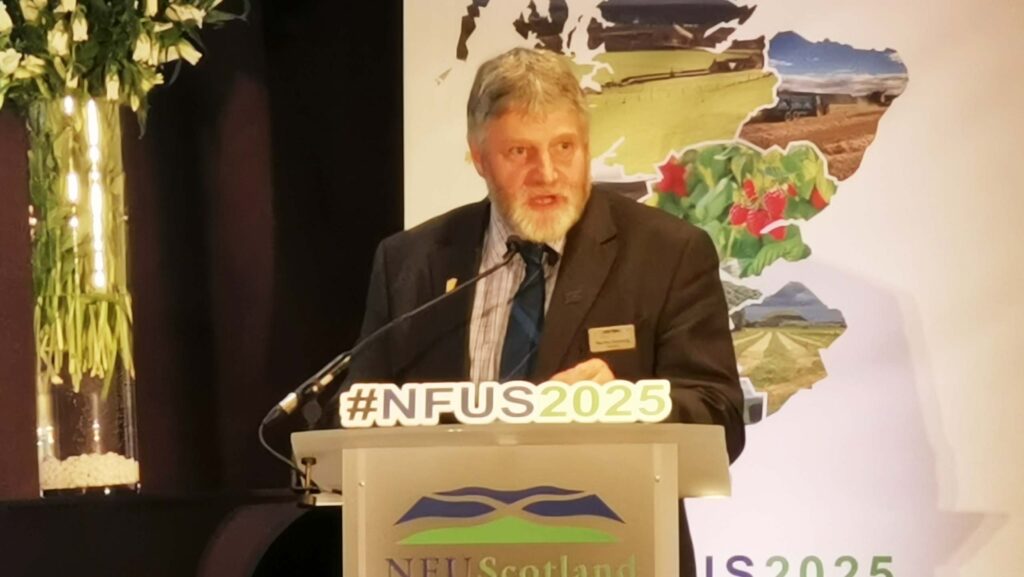Sludge protest could trigger Treasury talks, says NFUS president
 NFUS president Martin Kennedy © MAG/Philip Case
NFUS president Martin Kennedy © MAG/Philip Case Farmers stopping sewage sludge deliveries from water companies could pressure Treasury ministers to address inheritance tax reforms, NFU Scotland president Martin Kennedy has suggested.
Addressing the 2025 NFU Scotland (NFUS) conference in his final speech as president, Mr Kennedy said that this type of action “could have an immediate effect”.
“My own view, if we need to ramp up the pressure, is to take action that affects governments and authorities directly, but still keeps food on the shelves,” he told delegates at the conference in Glasgow on Thursday 6 February.
See also: Farmers threaten strike action over inheritance tax hike
Mr Kennedy said that if farmers stopped taking sewage sludge from the likes of Scottish Water and Thames Water, it would “really leave them in the s***”.
He asked: “What would [water companies] do, put it in the rivers? Oh! I forgot, they already do that.”
Sewage sludge, commonly used to enhance soil fertility, is supplied by water companies to farmers as part of a long-standing partnership aimed at waste recycling and soil enrichment.
The decision by farmers to stop taking sewage sludge, a key fertiliser for many farms, is seen as a symbolic act of defiance against the Labour government’s plans to introduce a 20% tax on agricultural assets worth over £1m from April 2026.
The Labour government has repeatedly said it is listening to the farming industry’s concerns about its farm inheritance tax (IHT) plans.
Chancellor ‘refusing talks’
But, if this is the case, Mr Kennedy questioned why chancellor Rachel Reeves has not given farm leaders the opportunity for a roundtable with industry leaders.
“On the face of it, the UK government are doubling down on this policy in the hope that we will simply go away,” said Mr Kennedy.
But he added defiantly: “That will not happen, and we will keep raising the profile on this until something changes.”
Mr Kennedy also highlighted 22 different case studies done by the Rural Accountancy Group, which represents well over 10,000 rural businesses across the UK. It found that family farm businesses “will now be heavily caught up in this tax when they wouldn’t have done before”.
“This all leads to no confidence and a lack of investment, yet chancellor Rachel Reeves says she is trying to create jobs and growth,” said Mr Kennedy.
Labour MP’s defense
Speaking at the conference, Kirsty McNeill, Scottish Labour MP for Midlothian, admitted that everyone in the room would be feeling disappointed by the UK government’s farm IHT plans.
But she said the new Labour government had been forced to make “many difficult choices” due to the £22bn “black hole” in public finances left by the previous Conservative administration.
“We could have just ignored it. We could have kicked the problem down the road. But when we stood for election we promised to take the hard choices head on. We needed to act,” she added.
Ms McNeill, who is also parliamentary undersecretary of state for Scotland, insisted that the Treasury’s numbers showing only about 500 estates a year will be affected were correct and based on actual claims, not the value of farms.
“Unfortunately, we also know that the reality today is that buying agricultural land is one of the most well-known ways to avoid IHT,” she said.
“This has artificially inflated the price of farmland, locking younger farmers out of the market.
“None of this is either fair or sustainable. That is why we are reforming how agricultural and business property relief work.”
Figures disputed
But Mr Kennedy told Ms McNeill that the Treasury’s figures were wrong, and analysis by the NFU reveals 75% of English and Scottish farms could be impacted by the IHT changes.
Audience members warned that other farmers – not connected to NFU Scotland – were planning more militant action in an effort to bring Treasury ministers to the table to discuss the matter.
